
The Waldorf Pedagogy
Aware that, among other aspects, it is the responsibility of private and cooperative education, within the autonomy granted by its status, to develop and implement innovative educational models that can serve as inspiration for the pedagogical community, the Waldorf School in Oliveira has undertaken to implement its educational and pedagogical project in accordance with the principles of Anthroposophical Pedagogy.
The principles and practices of this pedagogy were defined by the philosopher and researcher Rudolf Steiner, to establish a school that would better respond to the needs of the future, at the request of the workers at the Waldorf cigarette factory in Astoria. Due to the breadth of its scope and its inclusive nature, it is considered the first example of an integrated school in Germany, whose pedagogy spread to other schools, both in Germany and in neighbouring countries. After being banned during the Nazi regime, they were reborn in 1945, creating the Waldorf School Movement, which rapidly expanded throughout the world.
If a child is able to give themselves fully to the world around them through play, then in adulthood they will be able to devote themselves with confidence and strength to serving the world.
Rudolf Steiner
Educational Background
The following is a simplified overview of the school’s curriculum, which generally coincides with the national curriculum, but with some differences in terms of timing and practices:
Mother tongue – Portuguese
Language is our most important means of mutual understanding and therefore the primary means of education. It is also an extremely important formative tool in psychological and spiritual development, and cultivating it is a central task in a child’s education.
Mathematics
The teaching of arithmetic and geometric concepts is linked to the child’s awareness and motor activity. Counting is an internal movement that allows us to observe external movement. In the concrete operations stage, children still perform movements when they want to link two things, and these movements are connected to physical objects from which they cannot yet detach themselves.
If mathematical concepts blossom in the static and concrete phase, our goal is not to ‘generalise and abstract’ but rather to ‘concretise and consider each case individually.’ This prevents children from being confronted with abstract logical structures and encourages them to use their own experience to solve exercises.
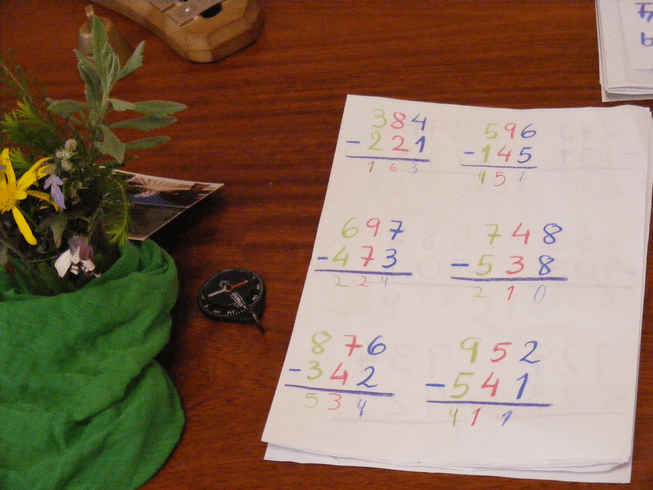
Environmental Studies
At our school, getting to know our surroundings begins with what is most familiar to us – our bodies – and gradually expands to increasingly distant surrounding areas. By getting to know ourselves, we become able to get to know others. By getting to know others, we see that both they and we are situated in a space. By getting to know this space, we are able to discover where this space fits in.
Starting with the small (the known), we can gradually move towards the larger (the unknown). Thus, when approaching geography, we begin with the study of bodily geography, moving on to the school space, the study of the surrounding village, the town that encompasses it, the city, the country, the continent, the world, until we reach knowledge of the entire Solar System. In this way, the spiral of knowledge becomes ever greater and more secure because it is anchored in the individuality of each student. As the student is the starting point for the progressive knowledge of the world, learning becomes meaningful and the student themselves becomes conscious and creative.
Ciências
In the study of Natural Sciences, the curriculum essentially covers topics within Zoology and Botany, relating them to the physical constitution of human beings. In class, phenomena are observed, experiments are carried out and these experiences are then described, thus arriving at concepts and explanations in a lively manner, respecting the student’s stages of development, so that their skills and abilities are expanded in a stimulating and effective way.
Concepts are learned through careful and precise observation of phenomena and the search for the scientific laws behind them. In human history, science also began with reflections based on the observation of natural phenomena until it reached scientific thinking.
In the field of zoology, a detailed study of various animal species is carried out, highlighting the differences that exist between animals of the same group and their respective particularities, understood as emanating from the interrelation of the parts with the whole. The physical constitution of human beings always appears as a reference, in the sense of the progressive understanding of their potential, unique in nature, to develop endless capacities, without, however, reaching the degree of specialisation that each animal species achieves unilaterally.
The study of botany and zoology reveals to students that different species form an evolutionary and integrated whole and that there are common and differentiating elements between humans, animals and plants. In order for learning to achieve the proposed objectives, it is essential to implement moments of observation of different plant and animal species, if possible in their natural environment.
The work developed in Botany and Zoology is complemented by artistic work in clay modelling, where we always start from the spherical shape, moving on to the seed, plant, shoots, fruits, or to the egg, receptacle and animal. The important thing is not naturalistic perfection, but the dynamics of growth from an origin.
Crafts / Painting
Waldorf pedagogy fosters artistic potential, expression and motor coordination. Art is present at all times of the day. Although there are specific times set aside for artistic activities, it is important to note that art is also present in Portuguese Language, Mathematics and Social Studies classes.
Crafts classes usually have an annual project where students learn and perfect a specific technique. Each of these techniques is closely related to the needs and abilities of the child in each school year. These projects include knitting, crochet, crochet with the introduction of other techniques, cross-stitch and sewing. In addition to these annual projects, this area also includes work with felt, folding, cutting, modelling, among others.
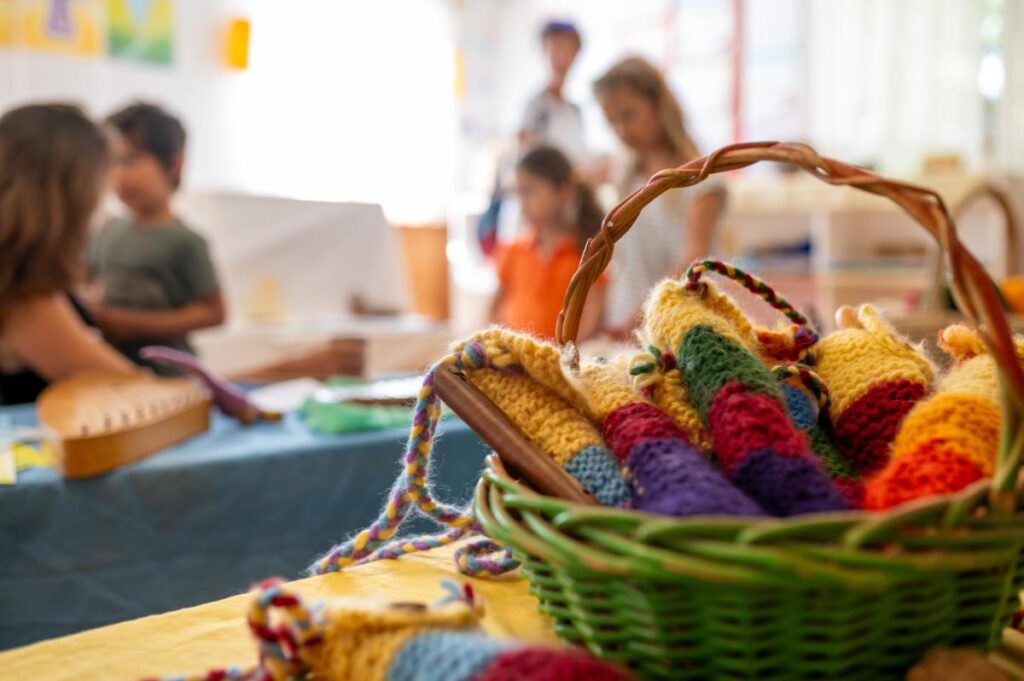
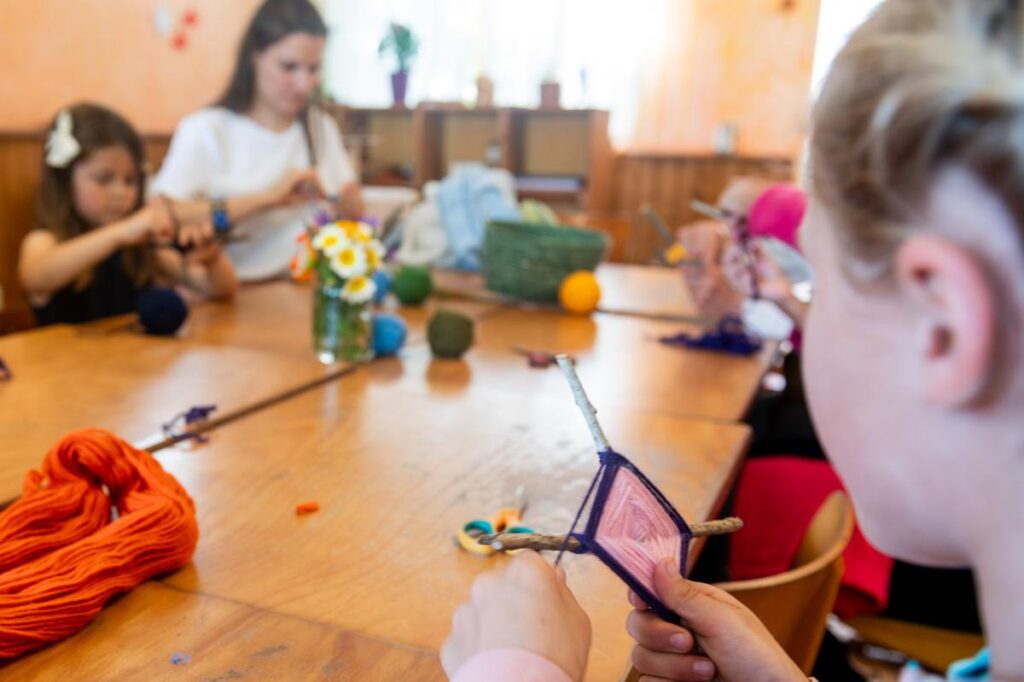
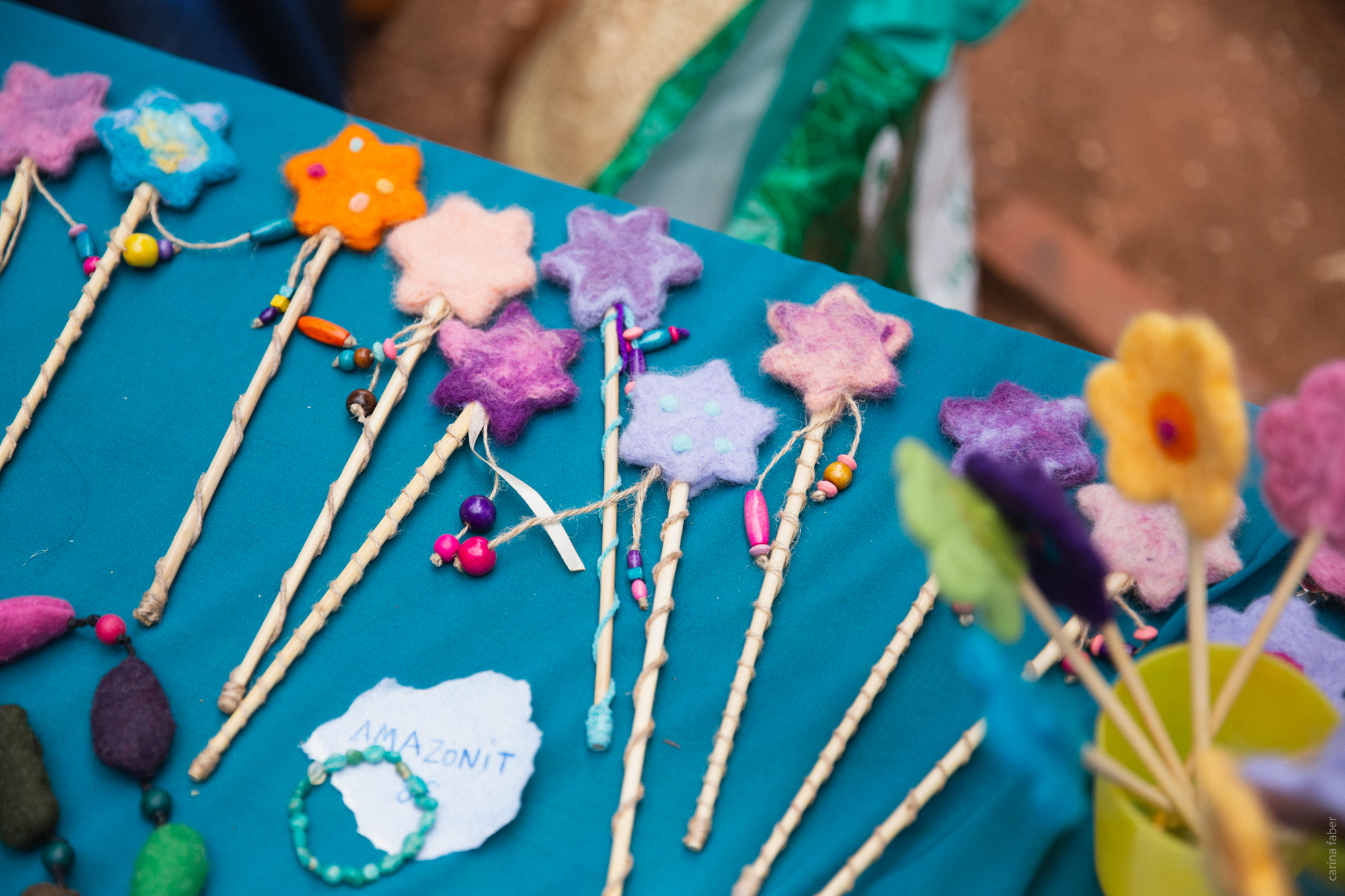
Music
The main objectives of music education at Waldorf schools are: active immersion in musical substance, practical experience, the gradual and progressive awakening of musical principles, and finally access to a knowledge base founded on direct experience.
Music encompasses three areas: one that, like language, concerns understanding and knowledge; another that connects to feeling through harmony, major and minor modes, and tension and relaxation; and finally, an area that connects to rhythm. These three areas reflect the emotional life of human beings.
Línguas estrangeira
In Waldorf education, foreign languages are part of the curriculum from the first year of school. The main objectives of foreign language teaching are to promote a positive attitude towards other cultures and, of course, to acquire the ability to listen, read and express oneself in another language. By learning a language, students have the opportunity to see the world in a different way.
In relation to the first cycle, the main competence is to promote an emotional connection with the foreign language. In this cycle, the foundations are laid for future reflection on the use and functioning of languages.
The Waldorf curriculum is unique in that it includes two foreign languages from the outset. Our school has opted for English and German.
Eurythmy
Eurythmy is a unique discipline of Waldorf education and has been part of its curriculum since kindergarten. Eurythmy works with the polarities of lightness and gravity and the balance that human beings establish between these two polarities. It is an artistic and therapeutic form of movement that works with oral recitation and music. The movements correspond to different vocal sounds or musical tones, making the sound ‘visible’.
Eurythmy makes the body more flexible so that children have more control over their movements and helps them to cultivate an inner sense of orientation. Body geography is the basis for following movements in relation to right, left, up and down.
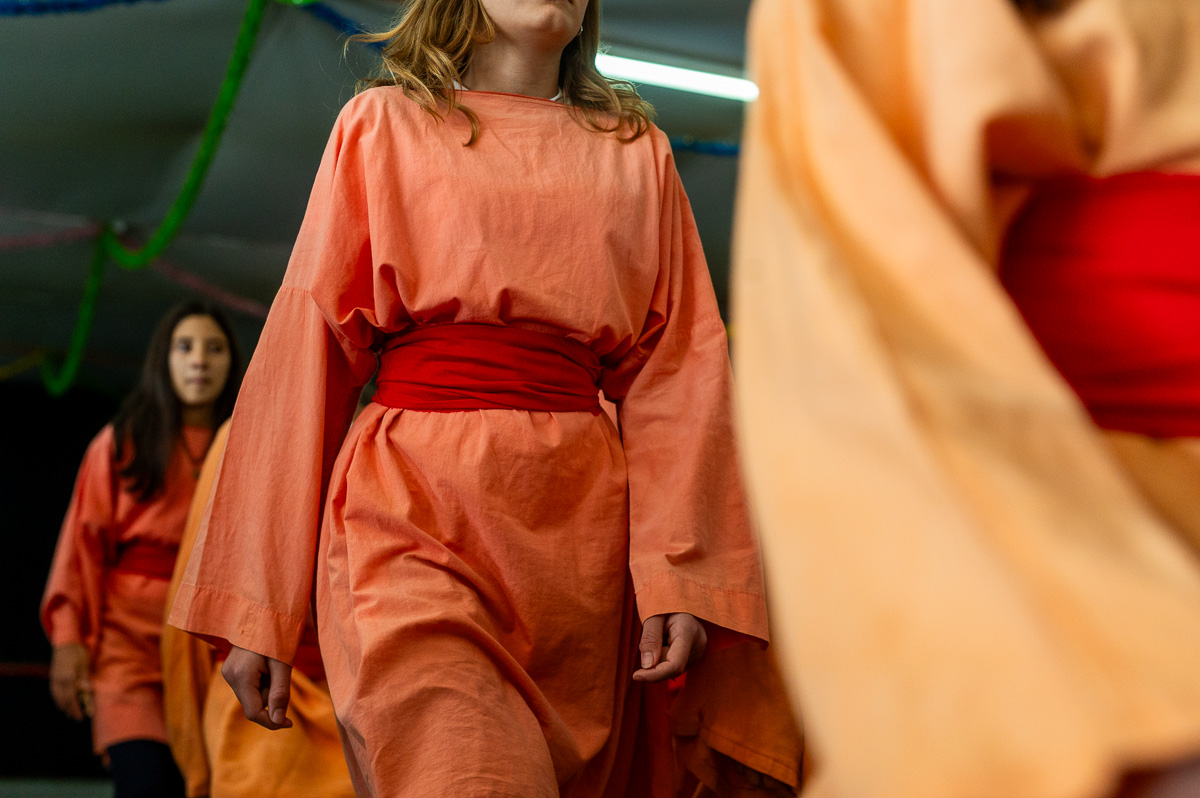
Ethics
Ethics is a specific moment in the development of citizenship education, aiming to develop students’ civic awareness as a fundamental element in the process of forming responsible, critical and active citizens.
This space for dialogue and reflection is based on the exploration of situations experienced by students, their concerns and questions relating to their life in the classroom, at school, in the community and in society.
Stories are also used to create an intimate space where dreams, fears, anxieties and desires can be discussed.
The central objective of this subject is to contribute to the construction of students’ identity and the development of their civic awareness. Aspects such as health education, environmental education and respect for difference, among others, are frequently considered.
Sports / Physical Education
From the first grade onwards, various types of social games are played, developing motor skills and social skills in the Sports class. From the third grade onwards, children start Physical Education classes, where traditional games are played, as well as individual and team sports. The fifth grade focuses on Greek games.
It should be noted that the competition that is encouraged is that which exists within the individual who wants to surpass themselves and do better and better, rather than in relation to a classmate. In team games, the focus is on the value of group cooperation.
Study
The Study aims to help students develop skills and working methods that will enable them to study more effectively and become increasingly independent. The aim is for students to acquire habits of research, collection, processing and synthesis of information.
Study time is also an opportunity to practise, exercise and consolidate subjects and receive more individualised support. Students can engage in activities that enable them to understand or deepen their knowledge of certain subjects at their own pace.
It mainly aims to reinforce mathematics and Portuguese language learning.
